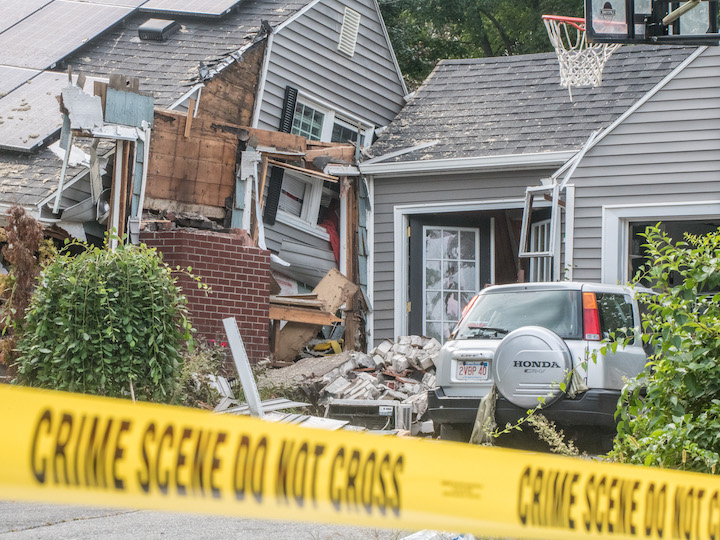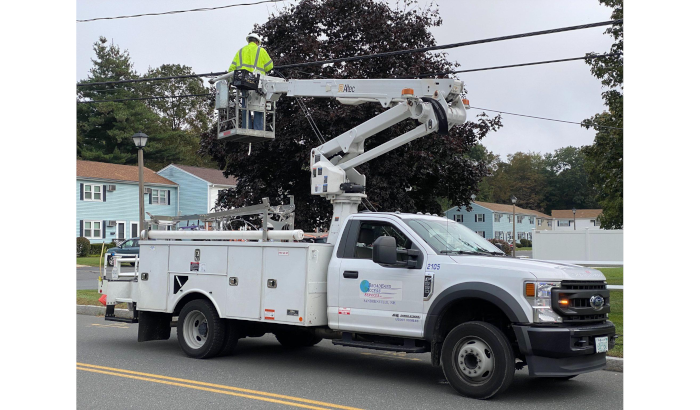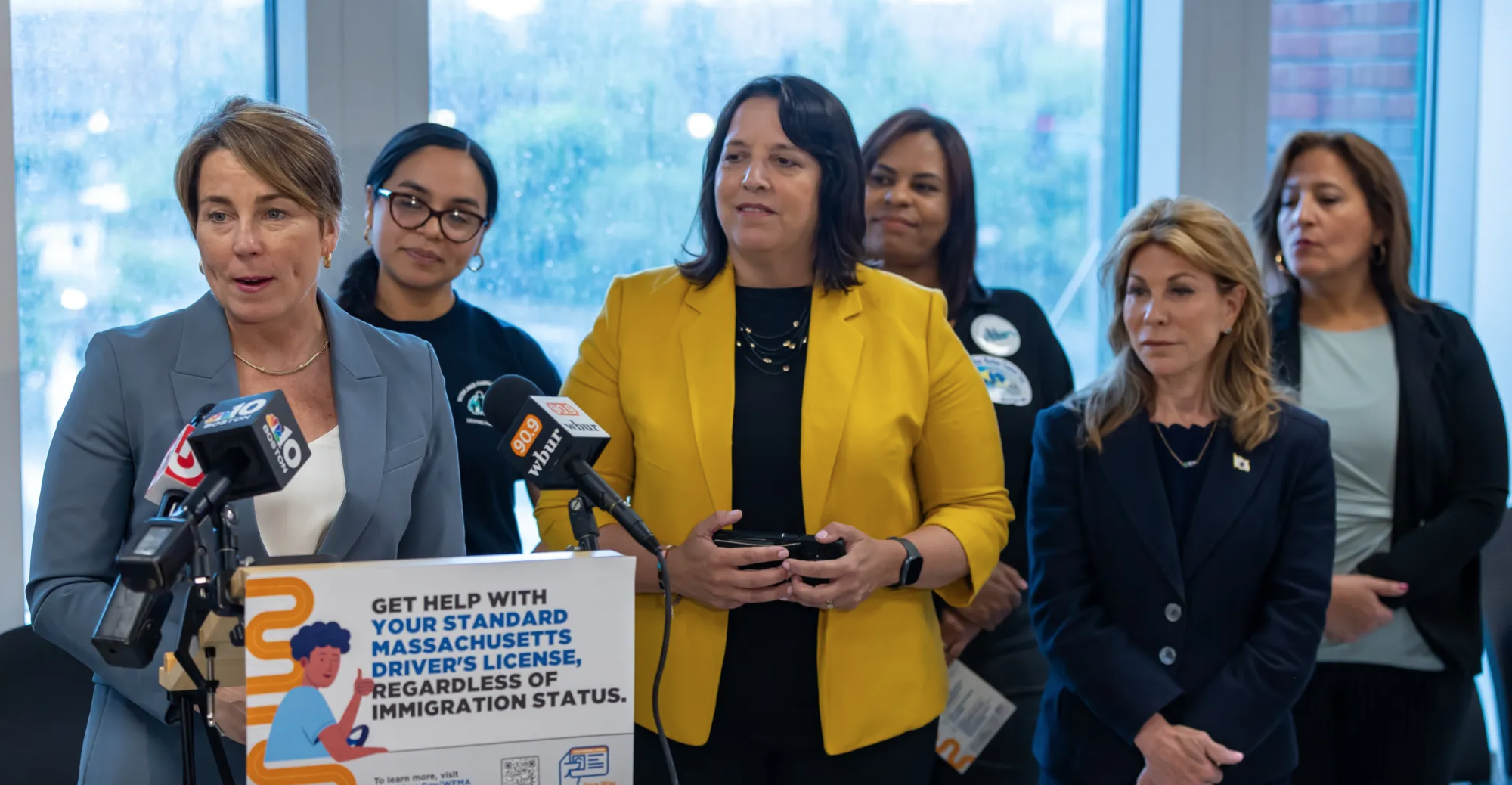A Merrimack Valley Natural Gas Explosion Time Capsule
Putting the extensive damage done in focus five years after a preventable fatal disaster disrupted northeast Massachusetts
Research and reporting by Chris Faraone, Emilia Perez, and Sophie Yarin | Interactive timeline by Zhaozhou Dai
In his comments introducing new federal emergency response plans last month, US Transportation Secretary Pete Buttigieg name-dropped a teenager from Lawrence who was killed when inadequate natural gas infrastructure under his city fatally faulted five years ago this week.
“As [Leonel Rondon’s] tragic death … reminded us, more must be done to ensure the safety of those pipelines.”
On Sept. 13, 2018, routine maintenance turned into mayhem after a gas line became over-pressurized in Lawrence. The resulting 10-alarm event involved at least three explosions and set off simultaneous blazes in that city and adjoining Andover and North Andover, and led to tens of thousands of evacuations, widespread utility outages, 25 hospitalizations, and one fatality.
“The first thing that came to my mind is that this was a terrorist attack.”
That was Andover Fire Department Lt. Bob Dalton’s initial impression when he began getting emergency calls after the blasts.
Lawrence native and business owner David Perez retraced the terrifying scene, and how his cousins lived on Waverly Road by the Lawrence-North Andover line, just blocks from where a young man died under a mass of rubble. The 18-year-old Rondon had just earned his driver’s license, and was sitting in his SUV when a chimney snapped off a house and crashed through his roof, hood, and windshield.
“The thing I remember the most was that it felt apocalyptic.” Perez continued, “They had checkpoints at every entrance into the city, and you had to wait in line so they could make sure you lived in Lawrence. And then you could go in at your own risk to get your belongings, but they told you they were going to be going into businesses and houses and cutting locks.”
Despite the fires and following fallout, the utter havoc unfolding from Sept. 13 barely made headlines past New England—even after revelations surfaced about underlying corporate negligence. There has been demonstrable accountability and political follow through though, enough for Secretary Buttigieg to frame a major new risk mitigation strategy around the worst disaster in regional memory.
In her testimony at a 2019 US Senate hearing, Rondon’s sister Lucianny told members of the body’s Commerce, Science, and Transportation Committee that “nobody should ever have to go through what my family has gone through ever again.” Echoing those comments in August, Pipeline and Hazardous Materials Safety Administration Deputy Administrator Tristan Brown said the changes delivered in the name of Lucianny’s brother incorporate “lessons from the 2018 Merrimack Valley tragedy to help ensure something like that never happens again.”
“Reckless disregard”
In 2020, Bay State Gas Company (d/b/a Columbia Gas) pleaded guilty to charges related to flouting federal standards in the Merrimack Valley. That June, the offending party was ordered to pay Massachusetts $53 million, the biggest criminal fine ever imposed under the Pipeline Safety Act, specifically for violations “relating to the failure to implement procedures to prevent … over-pressurization.” The company’s parent conglomerate, the Indiana-based NiSource, was also kicked out of the state and forced to unload its assets and business in Massachusetts serving in excess of 300,000 customers to competitor Eversource.
As investigations begat excommunication, prosecutors said that Columbia Gas “recklessly disregarded” regulator control line safety. Sections of pipe that helped monitor gas pressure had been neglected. The US Department of Justice’s blistering postmortem noted, “[Columbia Gas] knew that the failure to properly account for control lines in construction projects could lead to a ‘catastrophic event,’ including fires and explosions.”

“No family and no community should ever have to suffer a tragedy like the one that struck Lawrence, Andover, and North Andover in September 2018,” US Sen. Ed Markey said in August 2020. “The natural gas explosions were preventable, caused by carelessness, lax oversight, and the prioritization of profit over public safety.”
Markey wasn’t posturing after the Merrimack meltdown. He’d been sounding alarms about these issues for years, and in 2013 released a report titled “America Pays for Gas Leaks.” Detailing how “natural gas pipeline leaks cost consumers billions,” the senator’s office cited Massachusetts Greenhouse Gas Registry data to demonstrate how “lost natural gas accounts for at least 45% of Massachusetts’ methane emissions for large, stationary facilities.”
Along with Boston Gas and Nstar, Columbia Gas had “the most leak-prone pipes in their systems” as of 2012. That year, a Columbia Gas worker in Springfield struck an underground pipe while looking for leaks, causing a natural gas explosion that leveled multiple buildings and injured 18 people.
Checks and valiance
“When we pulled up on scene [a] guy said that all of a sudden he heard a noise, went down to the basement, and there were flames shooting 20 feet out of the side of his furnace.” Bob Dalton, the Andover fire lieutenant, recalled the pandemonium. “I had to shut the gas off to the house, [but] then we proceeded to get another call, and another call, and call after call after call for three to four hours. We did not stop.”
For some longtime residents of the post-industrial city, the blow felt personal. “Everyone knows it’s an old mill town,” David Perez said. “We grew up where everyone always thought no one cared about us—and this was the proof.”
It took nearly five years after that turmoil for the US government to “[improve] construction procedures designed to minimize the risk of incidents,” and to activate other recommendations to prevent a repeat of the Massachusetts explosions. Through their tribulations, residents of the impacted municipalities learned to expect delays, whether for settlements or sympathy. They had been ignored by the state and Columbia Gas before the 2018 fires, when they complained about the heavy smell of gas in Lawrence, and the waiting only became more unbearable after the problem blew up.
Looking back on 2018, Andover Director of Public Health Thomas Carbone acknowledged the hurdles that service providers—and, by extension, those they were helping—faced as days became weeks, then months. “Each of the three communities had trailer parks basically that we set up, and those trailers at least had some heat,” he said. “It wouldn’t have gotten you through the winter, but it was enough to warm up on a fall night.”
About 5,000 affected people were still homeless by Thanksgiving Day 2018. Several more months passed before permanently displaced families received enough compensation to relocate, and it would be nearly two additional years before a judge approved a $143 million class action settlement to be shared by the impacted parties. Officials kept the state of emergency that then-Gov. Charlie Baker declared for 718 days, until September 2020.
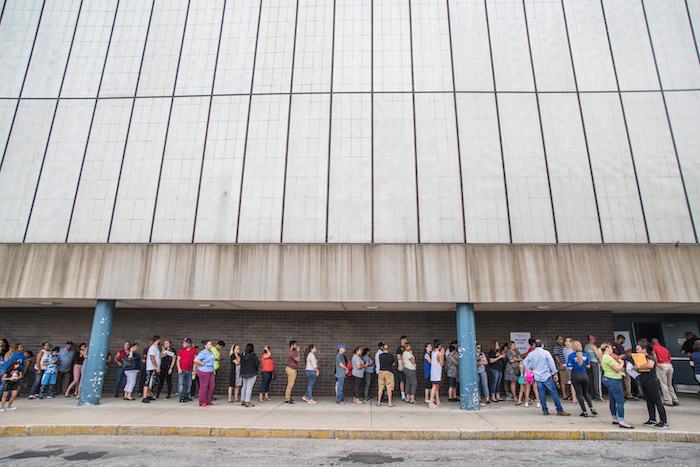
Meanwhile, during the COVID-19 pandemic, more than 2,500 Merrimack Valley residents missed a deadline to file a claim for their piece of the settlement pie, and wouldn’t see a payout for their distress until November 2022. When those checks finally arrived, the tardy petitioners were only compensated about $1,000 each for their inconvenience (in addition to any prior relief they may have received).
The rebound story around the recovery and cleanup has innumerable moments of humanity—from first-responder bravery, to community camaraderie, to hundreds of volunteers mobilizing to feed and house people. At the same time, an extensive after action report published in 2020 flagged snags in the joint utility, NGO, and multilateral government response, ranging from how “information was posted to websites and social media with varying details… [leading] to discrepancies and confusion concerning the [public-facing] message,” to weak internal comms and the resulting waste of resources.

“While the American Red Cross and Salvation Army were coordinating feeding at shelters, local shelter workers were simultaneously creating a second request for feeding for the same shelter,” according to the 2020 probe. State investigators (working in cooperation with the three stakeholding town and city halls) wrote, “As a result, two meals were being prepared,” while “Unsolicited food donations were also being received at shelters, creating an overabundance of food availability.”
“Stop & Shop had to wait for permission to reenter their space and salvage what they could since their power was down for the weekend,” Carbone said. “I remember working with their sanitarians on Sunday morning to see about the possibility of salvaging some of their frozen products to distribute to the food banks. Unfortunately, when they got in there they realized that it was too far gone and that they would be unable to share it, so they had dumpsters and dumpsters filled with food that had to be disposed of. The restaurants were all in the same boat.”
Broken channels
“Thank goodness this happened during the day.” Andover fire Lt. Dalton spoke of the magnitude of destruction which kept him running between calls for nearly 100 hours that first week. “If this had happened when people were sleeping, it would have been awfully tragic. It was tragic that one person died, but that could have been hundreds.”
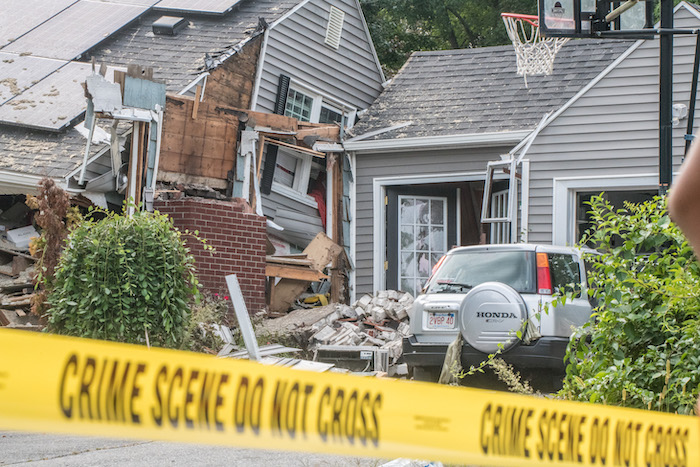
People who lived through the jolt and fumes then the ensuing months of uncertainty have spoken about lasting trauma, nightmares, and financial hits taken as a result of the 2018 calamity. It’s an incident they won’t ever forget, like those who suffered disproportionately because of their immigration status, or who weren’t deemed eligible for settlement compensation or business restoration funds for any number of reasons. David Perez, for example, lost his private community cannabis club before the end of that year.
“We still kept it going for a little bit after that, but it fizzled out,” he said. One of the explosions—on Salem Street in Lawrence—was just blocks from his event space. “We weren’t eligible for the vouchers because it was a commercial unit, and we had to pay rent for two months when we weren’t really able to do anything. We couldn’t sell snacks, or drinks, but we had to pay all of the bills for the place. Everybody else had some kind of help, but we were cannabis related, so there was no help for us.”
The quagmire was especially trying for Lawrence, where 41.3% of nearly 90,000 residents are foreign-born, 82.3% are of Hispanic or Latino origin, and the number of housing insecure individuals and persons in poverty is as dire as it is futile to accurately tally. When Massachusetts Emergency Management Agency rescue crews set up more than 400 trailers and a 1,000-bed congregate shelter in the city to furnish relief for those forced from their homes by fumes and flames, authorities prevented known chronically unhoused people from using the resources.
For Spanish speakers, the lines of communication were as broken as the gas lines. Per the 2020 after action report, while “communications accommodations were made for the deaf and hard-of-hearing community, providing language translation services to accommodate Spanish-speaking residents was not initially considered.” There were similar roadblocks to financial relief, as Columbia Gas didn’t coordinate with local leaders enough to “understand the demographics of the impacted communities.” “For instance, there was a significant language barrier initially between Lawrence residents (many of whom are Spanish speaking) and Columbia Gas representatives.”
A good fight
Northeast Massachusetts wasn’t the first or last place NiSource put paydays ahead of people, dragging their feet on needed repairs and paying lawyers and lobbyists to resist regulation.
According to charges that were later filed against Columbia Gas of Ohio, the company “recklessly disregarded a known safety risk” and failed “to properly account for control lines in construction projects” in that state. Multiple NiSource fines stemming from damage done as recently as 2020 include $400,000 for its involvement in a northeast Ohio house fire caused when an excavator severed an unmarked gas line. None of which stopped the utility from asking regulators to approve a controversial $212 million rate hike soon after.
As Energy News Network reported, despite the 2022 move by Columbia Gas of Ohio to triple a fixed distribution charge for customers, the company was publicly extolled by community leaders whose organizations it funded or had relationships with. The NiSource Charitable Foundation gives millions of dollars to nonprofits across the country in any given year, including in the Buckeye State and other places where it operates.
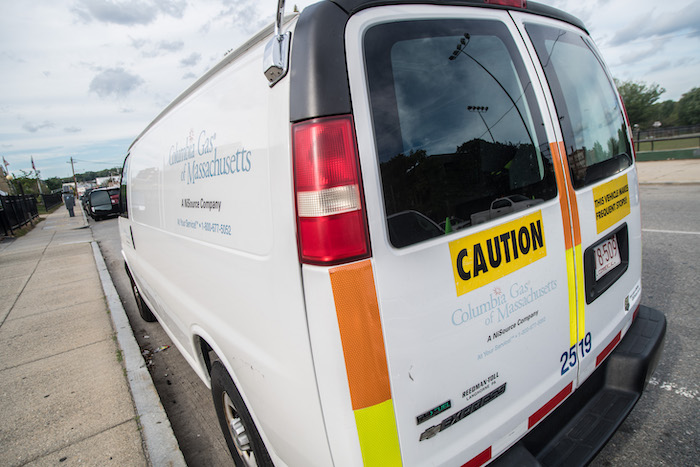
In Massachusetts, while its foundation supported philanthropies, the gas giant was also politically active. In the half decade leading up to the Lawrence and Andover over-pressurization, NiSource spent more than $600,000 lobbying Beacon Hill lawmakers on “all legislative and executive matters pertaining to the utility industry.” That’s in addition to the tens of thousands of dollars that NiSource managers and executives gave to the campaigns of state electeds, both directly and through a political action committee that was dissolved in 2020.
Columbia Gas continued to retain lobbying help in the commonwealth after the Merrimack explosions triggered inquiries into their business practices. In 2020, the year the company was jettisoned, the C-suite spent $132,000 pushing its “petroleum, hydro, nuclear, [and] oil” interests.” NiSource may have left Massachusetts, but it’s still politics as usual for power brokers and their dogs in public office. According to a Boston Institute for Nonprofit Journalism analysis, the state’s five for-profit utilities, which function as regulated monopolies responsible for distributing gas and electricity to residents, cumulatively spent more than a million dollars on lobbying in 2022, a 17% increase from the prior reporting period.
Asked for comment on the five-year anniversary, a NiSource spokesperson wrote in an email, “The event in Merrimack Valley affected thousands and forever changed our history, and that of the industry as a whole. It serves as an important reminder to the essential duty we all share in keeping our customers, communities and one another safe each day. The impact … still remains etched in the hearts and minds of many in the Merrimack Valley community, the emergency responders and our employees across NiSource who responded. And, while we acknowledge and recognize the events of the past, we remain squarely focused on continuing to strengthen our safety culture and our future.”
Engineers and experts say the new federal safeguards put in place under President Joe Biden and Transportation Secretary Buttigieg will spur major overdue fixes. Motivated by the preventable death of a teenager and calamity caused by a company serving its shareholders, the measures serve as the most serious kind of reminder of what went wrong five years ago.

“People in a city like ours, large in heart and work ethic, find themselves feeling a little bit small fighting a company like NiSource or Columbia Gas,” then-Lawrence Mayor Daniel Rivera said at a ceremony honoring Rondon in 2019. “We’re always up for a good fight, but boy what a difference it makes to have people help us in important and powerful places.” With tears drying on his face in the September sun, he alternated between English and Spanish, as he’d done during press conferences in the days after the explosions, as responding forces failed to field interpreters.
Rivera then thanked Sen. Markey for making the federal case for relief and repair: “We had the opportunity to tell our story [during the 2019 Senate hearing], and the Rondon family had an opportunity to tell their story into the congressional record and to hold Columbia Gas responsible for what they said on the record.
“We learned a lot that day,” he added. “Because the moment [NiSource executives] finished talking, they just bounced.”
This article is syndicated by the MassWire news service of the Boston Institute for Nonprofit Journalism. If you want to see more reporting like this, make a contribution at givetobinj.org

